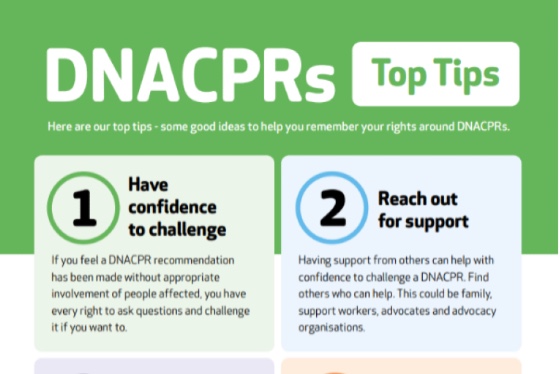The Healthcare Inspectorate Wales (HIW) has published a report setting out the findings of a review of Do Not Attempt Cardiopulmonary Resuscitation (DNACPR) decisions for adults.
Cardiopulmonary Resuscitation, commonly known as CPR, is an emergency lifesaving procedure, performed when a person’s heart and lungs stop functioning.
DNACPR decisions are an important part of end-of-life care, and during the course of our lives many of us will be involved in these discussions, either on a personal level or in relation to a loved one. The HIW says it is important that these discussions, and the decisions made, happen in a sensitive and effective way to respect the wishes and views of all of those involved.
When done well, DNACPR discussions can be a positive experience, offering clarity at a time of uncertainty, to ensure that distractions are limited at such an important and emotive time, the HIW says.
The review explored whether patients are actively involved in decision making about DNACPR and whether those decisions are clearly recorded and communicated between healthcare professionals. Our findings highlight clear examples of noteworthy practice across Wales, however, there is room for improvement. In particular, we found there is a need to strengthen communication about DNACPR decisions across healthcare teams, and with patients and their loved ones, to ensure people fully understand the reasons for the decision and the plans about care.
A key area and focal point during the review, and one where improvement is required, is the need for accurate and effective recording on DNACPR forms. The form is used to advise clinicians not to attempt CPR when death occurs and is designed to be easily recognised and swiftly verifiable on one page, allowing clinicians to make quick treatment decisions.
The HIW reviewed approximately 280 forms and found inconsistencies in the quality of recording key information. Some were completed well, but others were incomplete, or it was difficult to read the written information. However, the HIW said it was positive to find some good examples of concise, and thorough explanations of patient discussions, and detailed narratives in patient records to support the DNACPR form. It found:
Communication plays a critical role in effective DNACPR decision making. There are opportunities for improvement in this area, to ensure that discussions about DNACPR are thorough and informative. Most staff we engaged with emphasised the importance of personalised communication, which should be conducted in an open and honest way. However, this could be strengthened further, by initiating DNACPR conversations with patients earlier in their illness, rather than towards the end of their life. This is vital in helping people to feel informed and to understand what will or will not happen once the decision is made not to resuscitate. It was disappointing to find that almost half the respondents in our public survey felt their accessibility needs were not considered during DNACPR discussions, and most said their communication needs or preferences were not discussed.
Understanding a patient’s wishes at the end of their life is a fundamental element of good care. We found more can be done to improve people’s awareness of DNACPR, and their access to information resources, so that they can come to terms with and understand the DNACPR decision process. Whilst the review identified that resources are available, it was disappointing that three quarters of respondents to our public survey said they were not provided with supporting information about the decision not to resuscitate.
A key issue identified throughout our review relates to patients having the mental capacity to communicate decisions about CPR, and how well these details were recorded on the DNACPR form. Whilst this section was generally well-completed for patients who had capacity, this was not consistent for those lacking capacity. Some forms and clinical records were contradictory, inconsistent, or lacked evidence of a mental capacity assessment having been undertaken. Based on the records we reviewed, we are not assured that the DNACPR decision making process is always completed in line with the all-Wales Policy for patients who were deemed to lack capacity.
It was concerning to find that almost a third of staff responding to our survey felt that communication across healthcare teams regarding DNACPR was not at all effective. A theme arising from our survey was the need for effective information sharing across healthcare teams, with particular reference to the need for an all-Wales electronic repository for the DNACPR form. Such a system would support health and care providers to access information about a DNACPR decision, promptly.
Training and support for staff around DNACPR discussions and decision making was a consistent theme within our review. Whilst there are training modules, resources and information available nationally to aid clinicians, their awareness of these, or their ability to access them, was a recurring issue. These resources are valuable and can help ensure that DNACPR discussions can be held in a person-centred way.
It is important to highlight that the staff we engaged with endeavour to support people with the dignity and respect they deserve during the end of a person’s life. We have found positive examples of where DNACPR discussions took place well, and in a timely manner before the end of someone’s life. However, these can be challenging and distressful times for those involved, and sometimes there is little time available for thorough discussions, particularly during unforeseen emergency situations.
Alun Jones, Chief Executive of Healthcare Inspectorate Wales said: “Understanding a patient’s wishes at the end of their life is an essential element of good care, and I expect health boards, trusts, and Welsh Government to carefully consider the content of this report and the overall findings from our review. I also expect health boards and trusts to consider the feedback from staff and the public highlighted throughout the report, to consider how these can influence improvements within the DNACPR decision making process.
“I must take this opportunity to pay tribute to the staff who take part in discussions about DNACPR decisions, and to those who provide care and support to people at the end of their lives. The compassion and dedication of those we engaged with throughout this work is heartening and provides a strong and positive basis upon which to improve.”
Photo by Catrin Ellis on Unsplash





